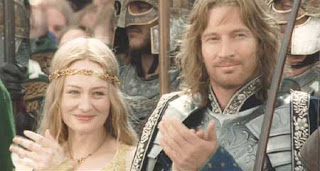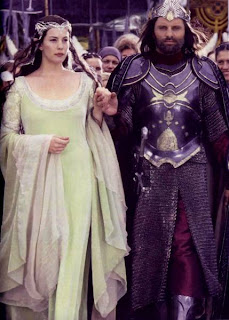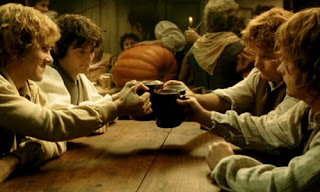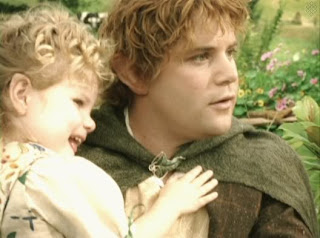This is an unpopular opinion: I like the ending of Return of the King. I do not think it’s
too long. Nope. It’s just right.
Yeah, I probably lost you there. Let me explain.
I was rewatching Return
of the King last week with my friend Duc, and when we got to the end, she
got up, because as she put it, “The movie’s too long. It should end after the
coronation.” She left, and I stayed through the extra ten minutes or so of
story, wondering if she was right.
Spoiler alert: No.
I agree entirely that the film version of Return of the King has a lot of endings.
It does feel a bit long. But I argue that every single one of those endings is
necessary for some reason. Let’s break them down.
The first ending: Sam and Frodo huddled on a rock on the
side of Mount Doom, while lava flows around them, and they reaffirm their
bromance.
Obviously, this couldn’t be the end, right? I remember
sitting in the theater, and when the screen went black, I screamed because I so
mad. They couldn’t end it there! How dare they! While it’s true that at that
point in the film nearly all of the storypoints had been finished up, the major
issues resolved and the future of Middle Earth determined, there was absolutely
no closure.
The second ending: Gandalf comes by and picks up Sam and
Frodo with some giant eagles. Whiteout as we fly over the lava.
I didn’t want this one to be the end either, because it felt
tacked on. It’s not much more resolution than we already had, just a quick
assurance that Sam and Frodo would live, and probably be okay. Yeah, that’s not
going to cut it, buddy.
The third ending: After a merry romp of bed-jumping, the
reunited Fellowship smiles gently at each other inside Frodo’s room in the
Houses of Healing.
Now here, we’re actually starting to get more closure.
Everyone from the Fellowship except for Boromir is alive and well, they’re all
happy to see each other, and we can tell that the emotional healing has begun.
You could leave the story here, and it wouldn’t be awful. I mean, the fans
would gut you, but you could. The story would feel relatively wrapped up.
But not entirely.
The fourth ending: Now, this is where Duc says it should
have ended. Aragorn is crowned King of Gondor, everyone applauds, he gets back
with Arwen, we see that Eowyn and Faramir have hooked up, and the hobbits get
their due. It’s sweet, well done, and a fitting end.
This is where things get tricky. You see, I do think that
this is where Return of the King should
and does end. Everything major from this part of the story is resolved, and
we’re not left with any lingering questions.
Except.
Return of the King
is not a whole story, and, really, it’s not a whole movie. It’s just one part
of a three-part film, and that’s what
needs to be wrapped up here. Return of
the King ends at the coronation. The
Lord of the Rings keeps going.
Because, when you get down to it, Lord of the Rings isn’t about a war, or a King, or even a shiny
ring. It’s about two little hobbits who go on an adventure. They see the world,
many beautiful things, and even more horrifying ones. They go to war, and then
they come home.
They come home.
That’s the important part of the story. Tolkien actually
made a point in the books of showing that the hardest part of any war isn’t the
fighting or even the making peace, it’s the end, when you come home and realize
that no one else has seen what you have. They all have their own petty little
problems, and they don’t give a crap that you’ve been through hell. The hardest
part of war is coming home after.
So, Tolkien made a conscious choice to show that. And, let’s
be fair, Peter Jackson cut out a hell of a lot of the end of Return of the King when he made this
movie. Believe it or not, but the original version is actually a whole third of
the book, where the hobbits come home and find that the war has made it even
there. They have to defeat Saruman (again) and retake the Shire. It’s
heartbreaking and poignant, and totally not in the films.
Instead, Peter Jackson went with a lighter touch, but one
that still conveyed the same message: it’s hard to come home, and it can be
good.
So, ending number five: The hobbits return home to the
Shire. Nothing’s changed, and they’re still as disregarded as ever. Sam goes
after Rosie Cotton, whom he’s been in love with since our story began, and
Frodo finishes the story that Bilbo left him. They settle down, and they get
back to life as usual.
But it doesn’t end there.
The sixth ending: The Grey Havens. The four hobbits
accompany Bilbo and Gandalf to the Grey Havens, where a ship is waiting to take
the Ringbearer, Gandalf, and the remaining elves to the West. Frodo realizes
that it’s time for him to leave as well, and after a lot of tearful goodbyes,
he gets on the boat.
This is important to me, not just because I’m enough of a
fan that I would have been outraged if the Havens had been cut, but also
because it completes Frodo’s journey. Yes, he came home, but he found that home
had nothing left for him anymore. He’d been utterly changed by the Ring, and as
much as he wanted to stay in Hobbiton, playing with Sam’s children and fighting
with the Sackville-Bagginses, he can’t. He doesn’t belong there anymore. It’s
time for a new adventure.
In the end, this is a story of two ordinary little hobbits,
who became extraordinary through no fault of their own. There are consequences.
They have been changed. And sometimes home isn’t home anymore.
Which brings us to the final ending, my favorite one: Sam
comes home.
That’s it. It’s just Sam walking down the path to his front
door, picking up his kids and kissing his wife. It’s the most ordinary of
ordinary, and after everything they’ve been through, it’s perfect.
Now, in the books, the endings do continue. Aragorn was a
great king, and ruled for a very long time. Eventually, though, he died, and
Arwen stayed by the side of his grave until she eventually passed as well.
Merry and Pippin went on to marry, have many children, and generally be the
sort of rascally old men that they were when they were young. Legolas stayed
with Gimli for many years, and when the time came, he built a boat and sailed
them both to the West.
And Sam. Sam and Rosie had thirteen children (!), and he
lived to be extraordinarily old. He finished Bilbo’s book, and was very respected
in the Shire. When the end came, he went to the Grey Havens and found a boat
waiting for him there. He followed Mr. Frodo one last time.
Urgh. I just made myself tear up there. I really love Sam’s
story.
Okay, so what’s the point that I’m making with this? Just
that there was a lot more to the ending, and we should be glad we got as little
as we did? Obviously not.
No, the point of this is that ending a story means knowing
what the story is about. If all Lord of
the Rings was about was a Ring and an evil army, then the movie was over
when the Ring was destroyed, the army defeated, and all our heroes together
again. But that wasn’t the point of this story.
Yes, the movie was long. I remember feeling like I was going
to burst by the end of it. (Midnight showings require caffeine, okay?) But movies
need to end when the real story is over, when it’s come full circle, when
things make sense again.
To this end, I actually do defend the epilogue to Harry Potter and the Deathly Hallows: Part
2. Yes, that movie was also hella long, and totally, the epilogue was
cheesy and badly executed. (Sorry, HP fans.) But it was important. You had to
see the world after it was at war, a world starting to heal. You had to see how
these kids, with whom you’d just spend seven years, would turn out. The plot of
this movie was over, but the bigger story, that needed wrapping up.
“How do you pick up the threads of an old life? How do you go on, when in
your heart you begin to understand there is no going back. There are some
things that time cannot mend. Some hurts that go too deep... that have taken
hold.” - Tolkien, at the end of Return of the King







Well spoke-
ReplyDelete